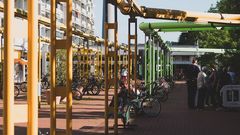The modern Olympic Games have to be seen as a cultural and historical legacy of the 20th century of global significance. As a gathering of the youth of the world, the Olympics did not only promote modern sport, athletic competition and spectacle, but also the idea of international understanding, confraternity, joy, and, most of all, peace. Still, the Games instrumental and commercial implications add an ambivalent notion to these noble goals. From November 7–9, 2019, the ICOMOS International Conference "The Heritage of the Modern Olympic Games" will discuss the material and immaterial legacy of the modern Olympic Games in Munich, the place of the Olympics of 1972.
The cultural and historic value of the former sites of the Olympic Games is without doubt. Most of the sites are recognized and protected as historic ensembles or individual monuments. However, the Olympics are not to be reduced to the famous stadiums, sports facilities, Olympic villages and parks. The events led to the construction and installation of numerous buildings, art works and infrastructures, which changed the appearance and workings of the respective guest cities, but are hardly appreciated as integral and original part of the Olympic heritage today. We think it is worth to direct attention to these smaller and less known objects and to assess them as part of the broader historic context as well as individual cultural accomplishments. What happened with these objects specifically after the games where closed? What potential do they bear to tell a more detailed, more complex or altogether different story of the modern Olympic Games than the wellknown iconic big buildings? In which way should we treat these objects as we are embracing our heritage? And what, by extension, could be our role as the emerging generation of care-takers in regard to the legacy of the late 20th century generally?
As part of the ICOMOS conference, we call for the submission of poster proposals for an exhibition and presentation which will take place in the context of scientific conference. We ask for contributions which are focused on individual objects, be them architecture, infrastructure, art, public installations or design. Based on the identification and assessment of their cultural and historic significance, and the documentation of their current state, posters should focus on, but are not limited to the following:
- public awareness and recognition,
- materiality and structural condition, or
- possibilities of conservation-restoration or conversion.
The Call for Posters is explicitly addressing graduate and postgraduate / doctoral students, as well as young professionals (up to 5 years after graduation) in the field of architecture, art history, conservation-restoration, contemporary history, cultural heritage studies, design history, landscape architecture and its history, structural engineering, urban planning, but is open to any field of study.
Deadlines and Dates:
submission of poster proposal (short description of suggested object and topic, 300 words max, short CV)
June 30, 2019
review of abstracts and notification to authors by
July 31, 2019
digital submission deadline (in print, DIN A1 upright and digital as pdf for presentation, template will be provided)
October 18, 2019
submission and hanging of printed posters by November 6, 2019 poster exhibition November 7-9, 2019 poster presentation November 9, 2019
Poster Awards:
The digital versions of the posters will be judged for award consideration prior to the ICOMOS conference. A panel of judges comprised of members of ICOMOS AG2020 will select three winners among the contributions of graduate students, postgraduates and young professionals.
Publication of the papers:
After the conference, a publication in English and German of the posters is planned, including a documentation of discussions and additional material (photographies etc.).
Scientific Secretariat for the application of the Call for Posters:
Please send your poster proposal (max. 300 words and a significant picture) and a short CV (max. 15 lines) to the email address olympicfollies@nb.ar.tum.de
Do not hesitate to use the same email address, if you have questions regarding the call.
In cooperation with
ICOMOS DE, International Council on Monuments and Sites, German National Committee
DASL, Deutsche Akademie für Städtebau und Landesplanung, Landesgruppe Bayern
BLfD, Bayerisches Landesamt für Denkmalpflege
TUM, Technical University of Munich, TUM Department of Architecture.
